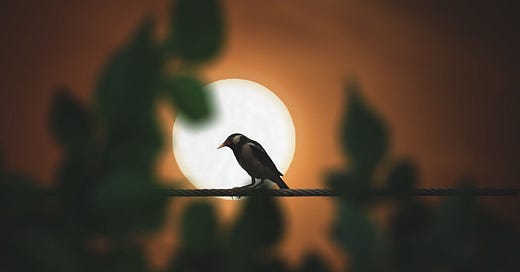Visiting Chicago was an adventure! I'm still getting caught up from the trip even though it's been a bit over a week, but my biggest takeaway was that the restaurants in the financial district weren't nearly as good I was expecting (especially for the price!). I did a lot of reading while I was away, though, I want to highlight some of the ... highlights
Nonfiction
This article about how some birds changed the pitch of their songs during the pandemic was fascinating, particularly because of the focus on how the birds haven't changed back to their old pitches, even though the reason for the pitch changes probably had to do with coping with noise pollution... which has definitely returned. Very thought-provoking.
Arguments between archaeologists about the purposes of small objects is one of my favorite topics. I've written about the annoying ubiquity of "items used for ritual purposes" before, but here's an interesting take about how ancient toys are really hard to have any certainty about, too, and are often offered as an alternative explanation when archaeologists aren't sure what something is for. "Must be a toy... or a religious object" is the way the saying goes.
A popular blogger named Scott Alexander recently had a book review contest, and the entry I keep going back to is this piece about 1587, A Year of No Significance which is about the decline of the Ming Dynasty from the perspective of the "boring" stuff, like a disinterested ruler and bureaucratic infighting. Nothing "big" happens, but it's a neat sort of "slice of life" biopic for an entire country and I really enjoyed it.
This deep dive into how heavy iron age bows were was particularly interesting to me, since I've got a chapter coming up involving arrows used in combat, and the author is a historian who always makes it a point to talk about things "enthusiasts" don't like to acknowledge when it comes to making and using replica war gear.
Fiction
I finally got around to reading Jade City by Fonda Lee, whose panels at the last Worldcon in Washington, D.C. I really enjoyed. The books were fantastic, albeit a little more emotionally fraught than I typically pick for escapism. More people died than I'm used to, which just means that it was unusually realistic for a fantasy novel. It reminded me of The Traitor Son Cycle in that regard, except about post-colonial Japan instead of late Medieval Britain.
Infomocracy by Malka Older was recommended by (I think?) Arkady Martine during a panel we were both on about legal systems in science fiction. It's near-future hard scifi, which is to say it falls under the banner of "it could happen" and presents a world that recently embraced micro-democracies thanks to ubiquitous Information research and lookup capacities. The characters were a bit less engaging than I usually go for, but the system and bureaucracy was really thought-provoking.
I re-read The Hedgewitch Queen by Lilith Saintcrow in preparation for my panel about gendered magic in historic fantasy. I'd forgotten how thoroughly I disapprove of the male lead, but it was a compelling look at a fantasy Aquitaine, which is honestly one of my favorite Medieval regions; Eleanor of Aquitaine and her mother Aenor are two of my favorite historical women.
I read Seasonal Fears by Seanan McGuire and was reminded of how much McGiure likes to include cheerleading and Americana in her "folkloric" books, which reminded me of Matt Stoller's ongoing investigative journalism series into the American cheerleading monopoly situation. It's remarkably sordid.



